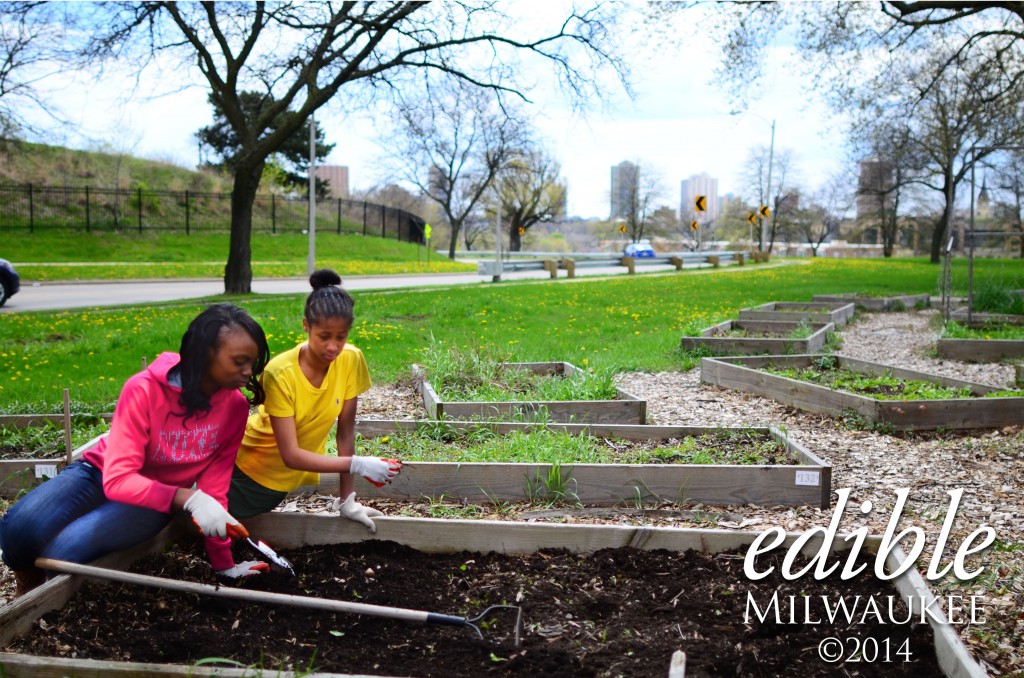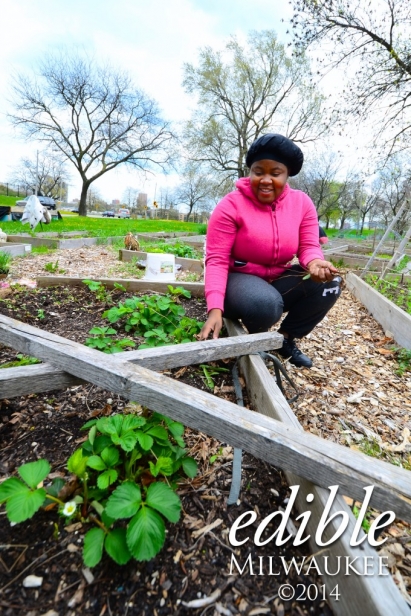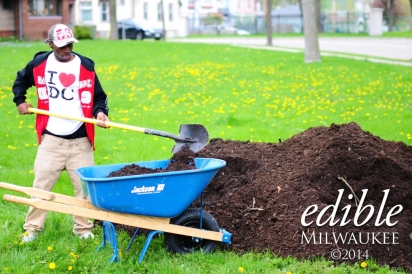Can Urban Gardening Fill Need for Farmers?
Groundwork Milwaukee seeks to train new crop
If you asked me to draw a picture of an American farmer, I’d start with an elderly white man in weathered denim overalls. He’s leaning up against a tractor, proudly admiring stretched-out rows of corn undulating into the horizon. Behind him is the farmhouse he grew up in, the one his grandfather helped build. This man was raised to be a farmer.
It looks like a stereotype, but let’s face it: American farmers aren’t getting any younger. Quantifying the trend, a 2007 Census of Agriculture report said the number of farm operators age 75 and older grew by 20 percent from 2002 to 2007, while those under the age of 25 dropped 30 percent.
Add to that the nation’s dwindling population in rural towns and an increasing migration to metropolitan areas, and one might start to wonder, Where will tomorrow’s farmers come from? I might be more worried if I didn’t live in Milwaukee. When it comes to our food supply, we don’t mess around. But just to be sure, I seek proof from Groundwork Milwaukee’s Young Farmer Program, an ongoing initiative working to carve out a profitable economic niche while empowering a racially-diverse generation of future farmers.
Fresh Gardeners, Fresh Ideas
I meet Shawnice Marrow, a high school senior, outside the Milwaukee Public Market off Water Street in the Third Ward. Three years ago if you had asked Shawnice if she wanted to be a farmer when she grew up, she would have said, “Not. A. Chance.”
“I didn’t know anything about growing vegetables,” she admits. “But once I tried it, I just liked it. It’s fun to get out and plant stuff.”
Shawnice was with two other teens, Terrell Davenport and Tristina Small, in the Young Farmers program. The group was on an outing led by Operations Manager Nick DeMarsh, whom the kids credit for their newfound agriculture skills.
“They’re seeing the market for the first time,” says DeMarsh. As the door swings open, you can hear the chatter of a space alive and bustling with shoppers. The crowds bounce from vendor to vendor, sampling cheese, tasting wine, selecting fresh flowers. It’s a mecca of all things food, and this summer, it’s adding a Community Supported Agriculture (CSA) to its list of offerings – thanks to the group of unsuspecting young farmers in its presence. Members who buy into the Groundwork CSA will be matched with a Young Farmer like Shawnice, who will grow crops selected from a menu of offerings. It’s all part of the program’s mission to bring food production into the community while educating youths on the fundamentals of entrepreneurship, management, customer service, and that thing called farming – a seemingly necessary life skill not included in the average high school curriculum. And it’s happening in the heart of a city with a population upwards of half a million. It goes by the name urban farming, and its evolution in Milwaukee is fostered by a community of ingenious thinkers willing to teach, listen, and adapt.
“The Young Farmers are showing how we can both improve the quality of food in our food system and reduce the use of fossil fuels in the process,” says DeMarsh. Last season, the teens sold and delivered crops on bicycle to their CSA members, which included several chefs at nearby restaurants. But with a customer base expanding into Milwaukee’s busy downtown, bicycle safety became a growing concern.
Instead, “we can deliver by canoe,” Shawnice explains. The idea came to her after spotting some rowers on the Milwaukee River.
“That’s the kind of innovative thinking we’d be missing if we didn’t listen to our youth,” says DeMarsh, adding that, “Shawnice’s idea is what led us to our new partnership with the Milwaukee Public Market. It’s just down the river from the gardens,” and it’s where Groundwork CSA members will be able to pick up their weekly delivery of crops.
This summer, the teens will meet every Wednesday and Friday at Kilbourn Gardens, home to more than 120 raised beds leased to local urban farmers through Groundwork Milwaukee’s nonprofit land trust, Milwaukee Urban Gardens. It’s in this Riverwest park that Shawnice learns about quality soil, worm composting, and how to be a role model for first-year Young Farmers.
Returning participants are encouraged to mentor a new Young Farmer. That’s how Terrell, reputed for his cream-of-the-crop cukes, introduced his cousin Tristina to farming. Most everyone has developed a specialty or favorite vegetable to grow. For Tristina, it’s thyme, but her admiration for all herbs is evident.
“I’d like to study more about herbal medicine,” she says. It’s a topic she learned after school in late afternoons spent at the Silver Spring Neighborhood Center on Milwaukee’s northwest side. “But I didn’t know where herbs came from until now.”
The program is designed as a four-year model to equip Young Farmers with the skills and financial know-how to transition to life as independent farmers. So far, Shawnice is piloting the effort as she approaches her senior year. She may or may not decide to pursue farming (which Nick defines simply as the business of growing crops for sale) as a full-time career, but she’s feeling empowered with the choice – a choice she’s helping make available to her peers.
Teens Teaching Teens
“So many people talk about what steps we need to take to protect the environment and improve the economy for future generations without even asking the youth what steps they would like to take,” DeMarsh says. “The Young Farmers model makes sure the students are involved in designing the program.” Sharing similar views are several other community initiatives that focus on peer mentorship.
At Michael Fields Agricultural Institute in East Troy, The Little Green Thumbs project was established as a collaboration between the kindergarten and first grade students from Leona Doubek Elementary and the students from East Troy High School. Together they worked side by side in the Children’s Garden at the Institute, transplanting seedlings and harvesting crops – all while teachers learned to take a step back and let the students become mentors. Today the Garden serves as a retreat for families to come out and experience how young minds cater to their own natural curiosities, whether it’s inspecting a leaf or chasing a butterfly.
Other farming programs cultivating student leadership concentrate on business strategies and team-building skills. In Newburg, the week-long Agricorps summer camp for teens ages 14-16, taking place this July at Wellspring Farm, lets campers create their own business and marketing plans, interact with other farmers, and experience selling at the local farmers market.
“One of the wonderful things about working with teens is when you see them teaching and mentoring others,” says Angela Rester, Executive Director of Wellspring Education Center and Organic Farm. Throughout the week, students work together to cook meals with the vegetables they harvest and exchange ideas on sustainable agriculture.
“The sharing and conversations with their peers are often the most meaningful,” Rester said.








